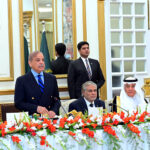ISLAMABAD, Sept 27 (APP): National Commission for Human Development (NCHD) Chairperson Razina Alam Khan Tuesday said education plays an important role in any society and nobody can even imagine modern and developed life without it.
She said all great civilizations of human society thrived because of knowledge, learning and excellence. A literate environment not only improves socio economic indicators in a society, it also positively influences systems of governance also.
“As a matter of fact, everything we create today is based on the knowledge that we obtain throughout our life by innovative education, technology and technology based products, Razina Alam said while addressing to the members of 43rd Commission meeting.
The meeting was attended by Roshan K. Bharocha, Saba Gul Khattak, Sono Khangrani, Dr. Mubashar Bhatti and Taimoor Khan Joint Secretary for Ministry of Federal Education and Professional Training.
“When the people of a nation are educated, they’d definitely carve ways to be self sufficient; an economically independent society is the stepping stone to combined productivity that leads to the economic growth of the nation on the whole”, she said.
Razina Alam said the most important national resource for development is the human labor force. “We the country of almost 200 million people where half of the population is women and 50 percent of them are illiterates, cannot progress due to illiteracy.”
Keeping in mind the low literacy rate of women in Pakistan, NCHD devised ‘Adult Literacy Program’ that focuses on women especially the mothers, she said.
NCHD has launched a countrywide enrollment campaign and 82,166 children have been enrolled by now in our feeder schools since April 2016, she informed.
While discussing the educational statistics in the country, chairperson NCHD said, the primary net enrollment is 72 percent, out of which 33 percent are dropouts.
Accessibility is one of the main reasons of low enrollment, in order to address this issue NCHD had established 5,949 Community Feeder Schools in underprivileged and remote areas all over the country, 6,581 Feeder teachers are working in these schools with 310,146 learners acquiring primary education.
NCHD has adopted Sustainable Development Goals, targets and indicators in the realm of literacy, non formal education, skill development and empowerment of women, she observed.
While discussing about NCHD education programs and initiatives she informed, NCHD had launched ‘Madrassa School Project’ to bring seminaries in mainstream and to provide formal education to the madrassa students in ICT, FATA, GB and AJ&K.
Strategy for establishment of 2000 Adult literacy centers and recommendation of the advisory council on framing National Policy on Non-Formal Education & Adult Literacy and National Plan of Action for achieving 90 percent literacy rate were discussed in detail with the members.
She further said, the launch of “Each One Teach One” campaign in Islamabad is also a very significant step by NCHD. If the educated youth voluntarily come forward to contribute to this noble cause, an enormous social change could be brought in the situation of literacy and education of the country. The university students can play vital role in this project, she added.
Briefly highlighting about NCHD projects she said, “we had launched ‘Literacy for Jail project’ to educate prisoners in the jails under a massive programme alongwith the skill development to make the prisoners useful citizens after their release from jails by completing their term.”
Currently eight Adult Literacy Centers are functional in Jails of Kasur and Toba Tek Singh, whereas others are in the establishment process. However, we plan to establish such centers in all 99 jails of the country.
She said this month we have launched ‘Non-formal Education project’, in collaboration with Japan International Cooperation Association (JICA) in Islamabad Capital Territory.
In this project, 50 non-formal schools will be established for the age group of 8 to 14 years.
“Education is absolutely beneficial for society on the whole, she stressed. It is a life-long process to each person that needs to be reinforced throughout life”, she added.
“However, we need education system that may eradicate illiteracy and may provide the common man an access not only to basic education but also to higher and technical education”, she emphasized.





